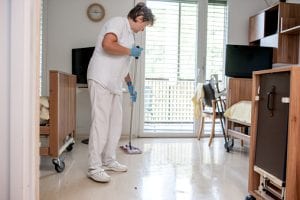 Sepsis is an infection common in nursing home residents that can become painful and deadly, if untreated. The problem is taking a growing human and financial toll, according to a recent study.
Sepsis is an infection common in nursing home residents that can become painful and deadly, if untreated. The problem is taking a growing human and financial toll, according to a recent study.
The September 2018 study by the Chicago Tribune and Kaiser Health News found 25,000 nursing home residents die each year after being transferred to hospitals because they were suffering from sepsis. Specialists blame the “growing public health problem” on poor staffing levels, according to the Advisory Board, a research, technology and consulting firm based in Washington D.C.
What is sepsis and who is the most at risk?
Sepsis is the body’s extreme response to an infection, which can start in your skin, lungs, urinary tract, or somewhere else. It sets off a chain reaction throughout your body.
Germs entering a body can cause infection and if the infection isn’t stopped, the result can be sepsis. While anyone can get an infection, certain groups are more susceptible to suffering from sepsis, with sepsis in nursing homes often occurring because the facilities fail to prevent bedsores and other infections that can lead to sepsis, according to the Advisory Board. State inspections found that 72 percent of U.S. nursing homes have been cited for not having or failing to follow an infection-control program.
Enough staffing should allow for nurses to check residents in nursing homes often enough to stop infections before they grow to bed sores and sepsis. According to the Mayo Clinic, bedsores, also known as pressure ulcers, are caused by pressure against the skin that limits blood flow to the skin.
Limited mobility can make the skin vulnerable to damage. In cases of sepsis in nursing homes, bed sores and sepsis can attack a resident who might be bedridden for long periods. That can happen when staff of the facility have failed provide periodic checks on the resident and failed to help the resident move, instead of just lying in place for hours or even days.
Federal minimum of having nurses spend 4.1 hours a day per resident yet to become a regulation
The cost of such failures to provide care in relation to sepsis in nursing homes, in terms of suffering and money, is huge. As part of their investigation into sepsis in nursing homes, the Chicago Tribune and Kaiser Health News commissioned an analysis about Medicare billings. The analysis found that caring for such patients cost Medicare over $2 billion annually.
The analysis done for the Chicago Tribune and Kaiser Health News study found that in Illinois, about 6,000 nursing home residents a year who were hospitalized had sepsis, and 1 in 5 didn’t survive.
Steven Simpson, professor of medicine at the University of Kansas in Kansas City, was blunt about the severity of sepsis in nursing homes.
“People don't go to a nursing home so they can get sepsis and die,” Simpson said.
Industry officials said low Medicaid payment rates hinder nursing homes' ability to hire more staff. A nursing home group in Illinois blamed its bankruptcy on state Medicare payments that were "slow, erratic, and significantly less than what we are due.”
Repositioning of residents is key to preventing sepsis in nursing homes. Those in wheelchairs should try shifting their weight every 15 minutes or seek help from staff once an hour. Residents in wheelchairs who have the upper-body strength can reposition by doing wheelchair pushups — pushing on the chair’s arms to raise their body off the seat, according to the Mayo Clinic.
Other tips from the Mayo Clinic are to use a special mattress to relieve pressure and adjust the elevation of the bed in the effort to avoid sepsis in nursing homes.
Thousands of nursing home residents and family members are filing lawsuits in relation to cases of sepsis in nursing homes. The suits allege cases of neglect, such as nursing home staff failing to reposition residents for hours at a time. Contact the Law Office of George S. Johnson LLC In Georgia today for help with sepsis in nursing homes and other neglect cases.
